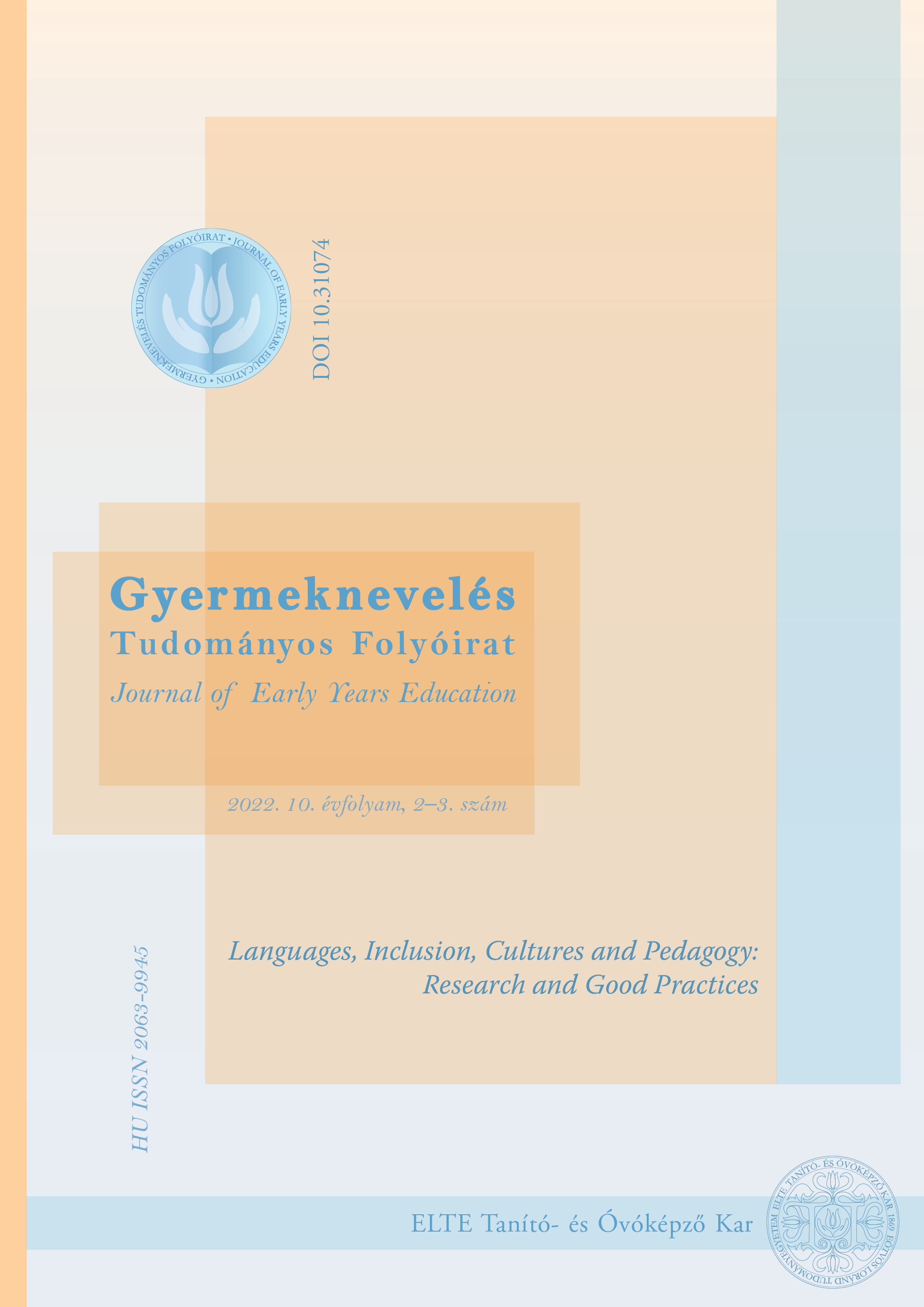The importance of raising the intercultural sensitivity of university students
DOI:
https://doi.org/10.31074/gyntf.2022.2.11.18Kulcsszavak:
intercultural sensitivity, international mobility, social issuesAbsztrakt
This paper describes the theoretical background of the planning and implementation process for an intercultural sensitivity training programme targeting foreign students based on the experience of a previous intercultural projects (Furcsa, 2009; Szaszkó, 2018). At Eszterházy Károly University (EKU) (Eger, Hungary), foreign students come from different countries to study in various fields and participate in a programme tailored toward raising intercultural awareness each semester. The authors of the present article actively contributed to the design and implementation of this special training programme developed for the incoming students at EKU. The main objectives of this intercultural sensitivity-raising programme are to gain a deeper knowledge and understanding of various cultures, focus on the issues of biases, stereotypes, discrimination, acculturation, problem-solving, skills development, and team building, all aspects that comprise focal points of this paper.
Letöltések
Hivatkozások
APA = American Psychological Association (2021). Discrimination: What it is, and how to cope. https://www.apa.org/topics/racism-bias-discrimination/types-stress
APA Dictionary of Psychology (2021). Cultural bias. https://dictionary.apa.org/cultural-bias
Berry, J. W. (1997). Immigration, acculturation, and adaptation. Applied Psychology: An International Review, 46(1), 5–34. https://doi.org/10.1080/026999497378467
Berry, J. (2019). Acculturation: A Personal Journey across Cultures (Elements in Psycho-
logy and Culture). Cambridge University Press. https://doi.org/10.1017/9781108589666
Brown, R. & Hewstone, M. (2005). An integrative theory of intergroup contact. Advances in Experimental Social Psychology, 37, 255–343. https://doi.org/10.1016/S0065-2601(05)37005-5
Council of Europe (2016). Competences for Democratic Culture: Living Together as Equals in Culturally Diverse Democratic Societies, Council of Europe. https://rm.coe.int/16806ccc07
European commission (2019). Key competences for lifelong learning. https://op.europa.eu/en/publication-detail/-/publication/297a33c8-a1f3-11e9-9d01-01aa75ed71a1/language-en
European commission, erasmus+ (2021). https://ec.europa.eu/programmes/erasmus-plus/about_en
Furcsa, L. (2009). Outcomes of an intercultural e-mail based university discussion project. Language and Intercultural Communication, 9(1), 24–32. https://doi.org/10.1080/14708470802684481
Hungary Helps (2021).Wonder biscuit for people suffering from hunger https://hungaryhelps.gov.hu/scyp
Kisné Bernhardt, R. (2012). Az anyanyelvi és idegen nyelvi írásbeli szövegalkotás vizsgálata a két tanítási nyelvű középiskolai oktatásban. Doktori (PhD) disszertáció. Eötvös Lóránd Tudományegyetem. Pedagógiai és Pszichológiai Kar. Neveléstudományi Intézet.
Kramsch, C. (2000). Language and Culture. Oxford University Press.
Nemetz-Robinson, G. L. (1985). Cross-cultural understanding. Processes and approaches for foreign language ESL and bilingual educators. Prentice Hall.
Oberg, K. (1960). Cultural shock: Adjustment to new cultural environments. Practical Anthropology, 7, 177–182. https://doi.org/10.1177/009182966000700405
OECD (2018). Definitions and classifications of the OECD international education statistics. In OECD Handbook for Internationally Comparative Education – Statistics: Concepts, Standards, Definitions and Classifications (pp. 33–75). OECD Publishing. https://doi.org/10.1787/9789264304444-6-en
Pegrum, M. (2008). Film, Culture and Identity: Critical Intercultural Litera-cies for the Language Classroom. Language and Intercultural Communica-tion, 8(2), 136–154. https://doi.org/10.1080/14708470802271073
Shields, R. (2013). Globalization and international student mobility: a network analysis. Comparative Education Review 57(4), 609–636. https://doi.org/10.1080/14708470802271073
Sá, M.J. & Serpa, S. (2018). A formação em competências transversais e a empregabilidade [Training in transversal competences and employability]. UAciência (Coord. Armindo Rodrigues), Açores Magazine (nº 12064), Açoriano Oriental, CLXXXIII(20269), 28–29.
Stanford Encyclopedia of Philosophy (2020). Discrimination. https://plato.stanford.edu/entries/discrimination/
Stipendium Hungaricum (2021). About Stipendium Hungaricum scholarship. https://stipendiumhungaricum.hu/about/
Szaszkó, R. (2018). Integrated skills and competence development through watching films in the target language. Paideia, 6(1), 91–102. https://doi.org/10.33034/PAIDEIA.2018.6.1.91
Tagiuri, R. (1969). Person perception. In Lindzey, G. & Aronson, E. (Eds.), The handbook of social psychology (pp. 395–449) (2nd ed.). Addison-Wesley Publishing Co.
##submission.additionalFiles##
Megjelent
Hogyan kell idézni
Folyóiratszám
Rovat
License
Copyright (c) 2022 Szerző

This work is licensed under a Creative Commons Attribution-NonCommercial-ShareAlike 4.0 International License.

